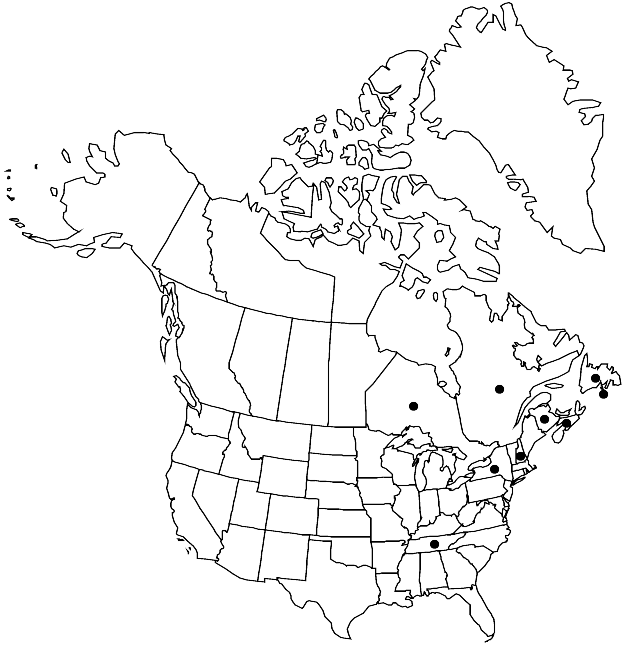Hygrohypnum subeugyrium
in H. G. A. Engler and K. Prantl, Nat. Pflanzenfam. 231[I,3]: 1039. 1908.
Plants soft, at stem and branch apices yellow-green, bright green, or dark metallic red, becoming reddish brown, maroon-red, reddish black, or brownish black in older extremities. Stems to 6 cm, extremities usually denuded, irregularly branched; hyalodermis absent, epidermal cells small, walls thick, similar to subadjacent cortical cells, central strand poorly developed or absent. Leaves loosely imbricate or falcate-imbricate, sometimes slightly complanate, straight or falcate-secund, little different when dry or moist, narrowly ovate, ovate, oblong, or oblong-lanceolate, shallowly concave in broad leaves to deeply so in narrower leaves, (0.9–)1–1.5(–2) × (0.3–)0.5–0.7(–0.8) mm; margins plane, not recurved at apex, entire, usually entire at apex, at least some leaves with margins slightly denticulate or serrulate in abruptly acute apex; apex gradually to abruptly acute to slightly acuminate tip, sometimes obtuse; costa double, short, slender, ecostate, or rarely single and slender; alar cells quadrate, short-rectangular, or irregular, small, not to slightly enlarged, walls strongly incrassate, region irregular, nearly undifferentiated, or differentiated; basal laminal cells shorter, wider than medial cells; medial cells long, linear-flexuose, (40–)45–80(–114) × (4–)5–6(–7) µm; apical cells shorter; marginal cells rarely longer than 55 µm. Sexual condition autoicous; perichaetial inner leaves ovate-lanceolate to long triangular-lanceolate, margins entire except few fine apical teeth, ecostate, costa double and short, or single to mid leaf. Seta yellowish red to red, 1.3–2.2 cm. Capsule with endostome cilia 1–3.
Habitat: Acidic rock in streams
Elevation: low to moderate elevations (0-1500 m)
Distribution

St. Pierre and Miquelon, N.B., Nfld. and Labr. (Nfld.), N.S., Ont., Que., N.H., N.Y., Tenn., Europe, Asia.
Discussion
Hygrohypnum subeugyrium may not truly belong in the genus. The species can be identified by the combination of dark pigmentation, alar differentiation, and leaf tip morphology. Except for stem and branch tips, the older extremities of H. subeugyrium are darkly pigmented reddish brown, reddish black, or brownish black. The transition from the yellow-green stem and branch tips to the darker, older extremities can be quite abrupt. Alar differentiation is clear but variable even among leaves on the same axis. The alar regions may form an irregular group of quadrate or short-rectangular, strongly incrassate, yellowish or reddish brown cells, or a basal row of enlarged, incrassate cells surrounded by a few that are quadrate or short-rectangular; both alar expressions may be excavated. Such alar cells are clearly different from the regularly inflated alar cells of H. eugyrium. Hygrohypnum subeugyrium is most easily recognized by the regular occurrence of a few leaves with abruptly acute apices that are minutely denticulate to finely serrulate among other leaves with entire apical margins.
Selected References
None.